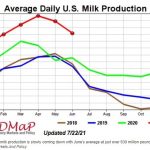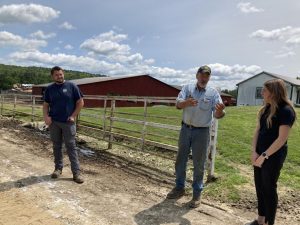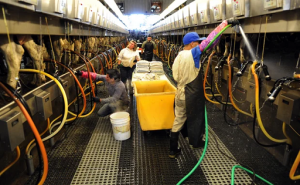
An ambiguity in Maine law prevented Stone from suing over the sludge containing the per- and polyfluoroalkyl substances, or PFAS, that was spread on his land as fertilizer and contaminated his cows’ milk to the point he couldn’t sell it. But Stone’s plight helped inspire a law, signed last month by Gov. Janet T. Mills (D), clarifying that legal cases alleging damage or injury from PFAS can be filed up to six years after the harm was or could reasonably have been discovered.
That new law, in combination with a second new Maine statute requiring land and groundwater tests where sludge has been spread, may have ramifications outside the state, attorneys said. Other states, including Michigan and New Hampshire, are considering PFAS-specific policies for damage claims, and other states may follow, they said.
The law “doesn’t mean we’re going to prevail,” said Stone, 65, who lives with his wife Laura on his family’s 107-year old farm in Arundel, Maine. “But, it makes it easier to get into the courtroom.”
An ambiguity in Maine law prevented Stone from suing over the sludge containing the per- and polyfluoroalkyl substances, or PFAS, that was spread on his land as fertilizer and contaminated his cows’ milk to the point he couldn’t sell it. But Stone’s plight helped inspire a law, signed last month by Gov. Janet T. Mills (D), clarifying that legal cases alleging damage or injury from PFAS can be filed up to six years after the harm was or could reasonably have been discovered.
That new law, in combination with a second new Maine statute requiring land and groundwater tests where sludge has been spread, may have ramifications outside the state, attorneys said. Other states, including Michigan and New Hampshire, are considering PFAS-specific policies for damage claims, and other states may follow, they said.
The law “doesn’t mean we’re going to prevail,” said Stone, 65, who lives with his wife Laura on his family’s 107-year old farm in Arundel, Maine. “But, it makes it easier to get into the courtroom.”
Opening the Door
More broadly, the laws have opened the door for lawsuits targeting paper mills, which are among the industries that historically generated sludge spread on agricultural lands.
Brian H. Mahany, managing partner of MahanyLaw, targeted more than a dozen paper companies, including Kimberly-Clark Corp., International Paper Co., and Scott Paper Co., in a June revision of the first lawsuit filed in Maine seeking damages due to PFAS.
The laws also offer a legal opening for homeowners like Troy Reny, who with his fiancé Ashley Gooldrup purchased their hilltop, 6-acre “dream home” in Fairfield, Maine, last year.
Well tests that the state later carried out found 12,000 parts per trillion (ppt) of one known-problematic PFAS called perfluorooctanoic acid (PFOA) and 12,800 ppt of another, perfluorooctanesulfonic acid (PFOS), Reny said. The EPA’s health advisory is 70 ppt; Maine’s newly-passed state limit is 20 ppt. Biosolids spread on a nearby farm caused the couple’s and their neighbors’ well contamination.
Reny, 29, and Gooldrup, 32, know the chemicals they’ve drunk are associated with reproductive problems. “It’s a scary thought to think having a child,” Gooldrup said.
PFAS, a group of thousands of compounds, got their “forever chemicals” moniker because it takes extraordinary means to break some of them down once they’re released into the environment. The PFAS of concern move from the air, water, and land into crops, livestock, and people. Some also are associated with health problems including increased cholesterol, weakened vaccine responsiveness, and increased risk of some cancers.
First PFAS-Specific
Maine’s PFAS-specific statute of limitations law—thought to be the first of its kind—resolves an ambiguity that existed in the state’s law. The overarching statute says: “all civil actions shall be commenced within six years after the cause of action accrues.”
But “accrues” doesn’t say whether the six-year clock begins when the harm was done or discovered, said Susan Faunce, who leads the mass tort practice in Berman and Simmons Trial Attorneys, headquartered in Lewiston, Maine.
The clarification means “instead of getting your case thrown out from the start because of a timing issue, any one harmed by PFAS will at least get their foot in the door,” said Faunce, whose law firm represents Stone and the Tozier Dairy Farm. Like Stone’s farm, the Tozier farm was forced out of business when PFOS was found last year in the cows’ milk.
Farmers like Stone had no idea the chemicals were in the fertilizer they spread on their fields decades ago, she said, nor did farmers or other people—unlike the chemicals’ manufacturers—know the chemicals were harmful.
“I’m not advocating make-work jobs for attorneys. I’m advocating for the farms that are getting screwed over,” Stone said.
Neither Faunce nor Reny’s and Gooldrup’s attorney, Russ Abney, with Watts Guerra LLP, have decided when they’ll file their cases or against whom they’ll seek damages.
‘Debilitating and Catastrophic’
Mahany’s proposed class-action lawsuit, brought initially on behalf of Maine residents Nathan Saunders and Judy Hook, asserts the PFAS in their well water resulted from locally spread paper mill sludge.
The lawsuit alleges these and other mills produced paper coated with PFAS to repel water and oil for food packaging and other purposes from 1967 through the present. During that time, they released tons of biosolids containing PFAS in landfills; sold or distributed biosolids with the chemicals for fuel or fertilizer; and sprayed contaminated fertilizer, the complaint said.
These activities caused widespread contamination and exposed the community “to toxic levels of the chemicals that are known to cause debilitating and catastrophic illnesses and diseases,” it asserts.
Scott Faber, an attorney and senior vice president at the Environmental Working Group, said the combination of Maine’s two laws have put the state at the forefront of addressing “the ticking tomb bomb” of PFAS-contaminated biosolids spread on millions of acres of U.S. farmland.
Legal ‘Pandora’s Box’
Lawsuits involving biosolids will raise a “massive Pandora’s box of issues we are going to have to work through at the state and national levels,” said David Shorr, a partner at Lathrop GPM LLP.
These issues include whether the event that triggers the deadline to file a damage claim is the land application of sludge, the chemicals reaching ground water, or crops’ update of the chemicals, said Shorr, who formerly held senior environmental posts in several Missouri agencies and the governor’s office.
Water utilities, which have fought numerous efforts at state and federal regulation of PFAS, supported the Maine law even though they didn’t get privately owned utilities exempted from liability exposure.
But Maine’s Water Utilities Association remains concerned about the law’s potential, unintended consequences, said Roger Crouse, who chairs the group’s legislative committee. The association testified in support of the law’s goal of holding polluters and the chemicals’ manufacturers responsible and praised a general liability exemption for government-owned utilities.
Utilities don’t use or generate PFAS; they receive them from upstream sources, Crouse said in a recent interview. Yet utilities could dragged into a lawsuit, which triggers the need to hire attorneys and prepare a defense no matter what a court may eventually decide, he said.
Money Can’t Fix
Rep. Lori Gramlich (D), who sponsored the testing and other bills Maine recently enacted into law, said she knew of Stone’s situation but had never heard him describe it, until he testified for her biosolids bill.
“His story tugged at my heart strings,” she said. “What happened with Mr. Stone elevated this to a really personal level that really resonated with a lawmakers.”
Stone said he’s grateful for the chance to go court. But even if he eventually succeeds, no reparations can make him whole again.
“How can you be made whole for five years of this?” he said.
Stone ticked off pains that still eat at him: being treated by local officials early on as the problem; being hundreds of thousands of dollars in debt; “not knowing from one day to the next how you’re going to pay for everything;” struggling with health problems he traces to the chemicals still circulating in his and family members’ blood; and being the farmer who had to apply for food stamps.
There’s also the pain of burying PFAS-poisoned cows. Stone’s love for his cows shows itself in how they nuzzle against him and the voice he uses recalling some of his favorites, like Moonglow, Storm Chaser, and Martini Tipper—a voice that sounds like he’s describing best friends.
“This was not supposed to happen on my farm,” he said. “How am I supposed to explain this to my father and grandfather when I die?”
To contact the reporter on this story: Pat Rizzuto in Washington at prizzuto@bloombergindustry.com
To contact the editors responsible for this story: Rebecca Baker at rbaker@bloombergindustry.com; Bernie Kohn at bkohn@bloomberglaw.com























